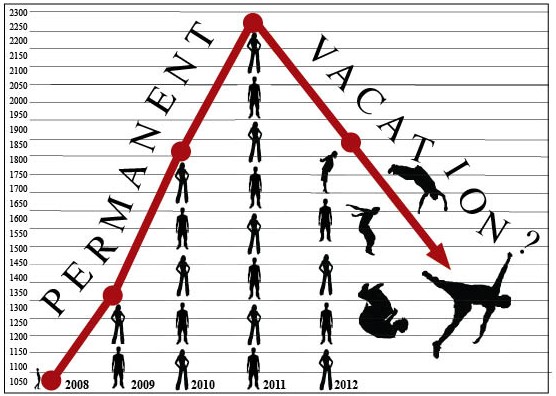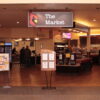Summer enrollment numbers are in, and the results aren’t quite what administrators were looking for.
“The picture isn’t as pretty as we would like it to be,” said former Interim Vice President for Student Services Jim Perez, as he braced the Board of Trustees at a recent meeting.
With only 3,481 seats filled out of the 5,321 offered, total headcount was down 18.2 percent, with full time enrollment (FTE) down a startling 20.3 percent.
“It can be a little hard to swallow,” Perez said.
So where did all the students go?
Perez said the main problem was a large reduction in federal financial aid, including the changes in Pell Grant policy, which no longer allows students to use the money for summer classes.
“Students didn’t mind taking summer school classes if someone else was paying for it, and all of the sudden if it’s like, ‘I have to go to summer school and I have to pay for it,’ it becomes much less desirable,” said Vice President for Student Services Graydon Stanley.
Stanley said in the future he would like the college to look into possibly creating summer-exclusive scholarships for students.
NIC wasn’t the only college to experience a drop, and with schools across the country facing low enrollment, the negative numbers might actually have a positive origin.
“We want to remain optimistic and take this as a sign that perhaps the economy is doing better,” Perez said.
Stanley explained it by calling colleges, particularly community colleges, “weird creatures” that typically flourish during times of economic downturns because people out of work will often turn to education to sharpen their skills for a more competitive job market.
Conversely, when jobs are plentiful, many cease to worry as much about continuing their education.
“This isn’t necessarily good for us though, because part of our funding is based off on enrollment, but the big picture is that if the economy is improving, that’s what we all want, too,” Stanley said.
Perez said there were also other smaller causes of enrollment drop that added up quickly.
“We were also able to determine that in previous years, many students enrolled at NIC during the summer were students from other universities. They would come home for summer and decide to take a class here at NIC,” Perez said. “That didn’t happen this year. Almost all the students that were enrolled at NIC this summer were NIC students.”
Strict drop policy also hurt enrollment.
“Students really need to have their stuff together, so to speak, in order to be successful,” Perez said.
Added to the problems, Stanley said, were the massive changes in the college’s leadership; summer session fell to the wayside as the president’s cabinet tried to effectively transition into a new administration.
“I think we were more reactive this year, by the time it was too late, instead of being more proactive on the front end and making sure enrollment wasn’t down by marketing these classes,” Stanley said.
However, Stanley said the college’s administration is already searching for strategies to change next summer’s outcome.
“I think we’ll take a real serious look at how we’ll do this next year, what classes are offered and we have kind of a traditional summer school setting here, maybe look at short-term fast kind of training, so you’re not eating up your whole summer,” Stanley said.
Stanley said finding unique solutions to draw in students will take creative problem solving, including possibly developing intensive week long courses.
“Really, it is so different from fall. Fall and spring semester are very traditional and everybody kind of knows what to expect. Summers are interesting that way because it’s probably more consumer driven,” Stanley said. “This is what students want, this is what they’ll take, this is what they’ll pay for, and [we’re] trying to figure out what those are to at least maintain or improve enrollment that way.”
Regardless of next year’s success, Stanley said students can always expect to see a continued tradition of offering summer classes at NIC.
“I think we’ll continue to develop resources to grow summer school. We don’t want to have all these facilities, all these buildings, and everything here and not have them utilized during the summer,” Stanley said. “Summer school is in no danger at all, I think you’ll see it morph into something different. “
Perez agrees.
“While summer enrollment is certainly part of the academic year, it a unique element in of itself,” Perez said.













